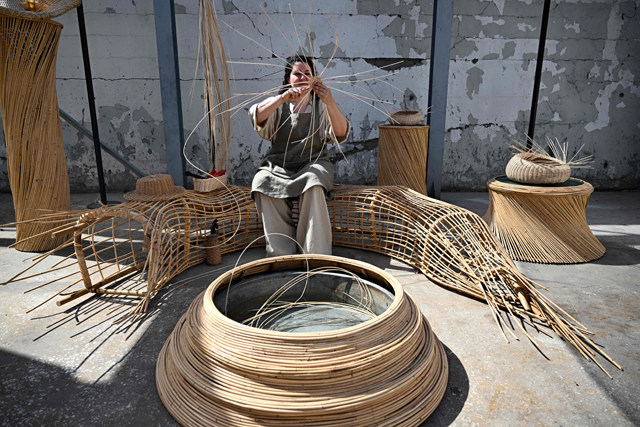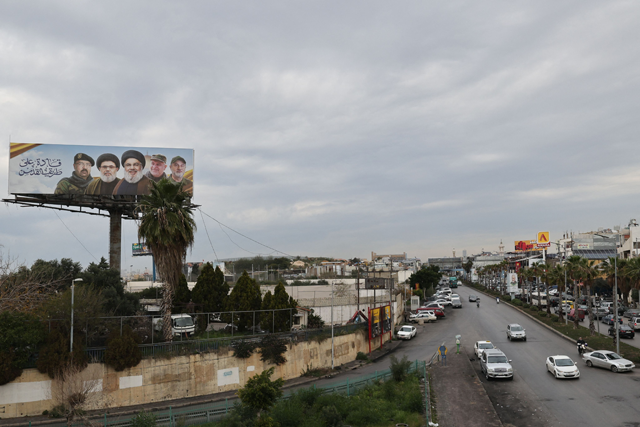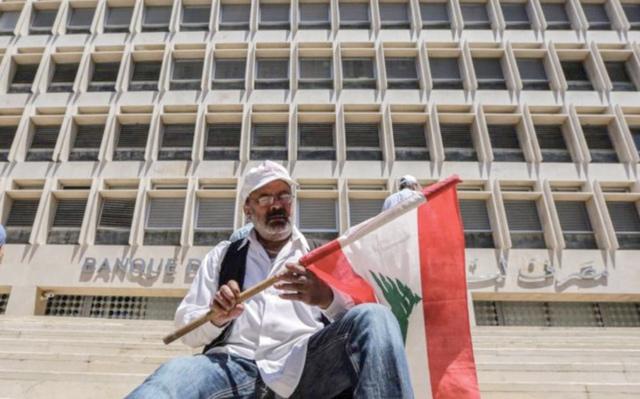You are here
Beirut design fair reborn after four years of economic crisis
By AFP - May 27,2024 - Last updated at May 27,2024

A Lebanese artisan demonstrates her skills in making objects from rattan, during the annual event 'We Design Beirut', a large-scale exhibition that celebrates Lebanese innovation in the field of design, blending national heritage and modernity, in Beirut on May 23 (AFP photo)
BEIRUT — A Beirut design fair has made a comeback after Lebanon's economic meltdown forced a four-year hiatus, with some pieces on display in spaces devastated in a deadly 2020 port explosion.
We Design Beirut, which ended on Sunday, exhibited work from more than 150 designers and artisans for four days in several locations in the Lebanese capital.
The fair aimed "to showcase the diversity of Lebanese design despite the country's difficulties", said Mariana Wehbe, who launched the event with industrial designer Samer Alameen.
The annual fair kicked off in 2010 but hit pause in 2019, when Lebanon's economy went into free fall, in what the World Bank would call one of the planet's worst economic crises in recent history.
The event was set to return in October last year but was postponed again after Palestinian militant group Hamas's attack on southern Israel triggered the Gaza war.
Since the day after the October 7 attack, Lebanon's powerful Hizbollah movement has been trading regular fire across the country's southern border with Israel in stated support of Gazans and ally Hamas.
"We are trying to make Beirut a centre for design and creation again," said curator William Wehbe, not related to Mariana, speaking from the capital's luxurious Villa Audi, one of the fair venues.
Designers and creative workers have been among those Lebanese leaving for better prospects abroad, some spurred by the lack of primary materials or after their workshops were destroyed in the 2020 port explosion, he added.
'Risk of extinction'
On August 4, 2020, a catastrophic explosion of poorly stored ammonium nitrate at Beirut's Port killed more than 220 people, injured at least 6,500 and laid waste to swathes of the capital.
Inside the opulent Villa Audi, a mirror installation took centre stage while large mushroom-shaped lamps lit the gardens.
Lamp designer Zein Daouk said she turned to ceramics after the office of her architecture firm was destroyed in the blast.
One fair venue near the port was also damaged in the explosion but was showing off modern sculptures and handicrafts as part of the event.
Mariana Wehbe said many artisans in Lebanon had "lost their jobs in recent years because many of the designers who worked with them have left", adding that some handicrafts were "at risk of extinction".
Dima Stephan, 34, who designs rattan furniture, said an artisan taught her how to make traditional Lebanese chairs — a craft traditionally reserved for men — and she now adds a modern twist.
The fair also presented works and crafts made with recycled materials, in a country also known for its waste crises.
In an abandoned textile factory in Beirut's Armenian district, university students displayed a giant installation made of recycled plastic and shaped like a volcanic eruption.
"We wanted to support students so that they do not leave crisis-riddled Lebanon," Wehbe said.
Related Articles
BEIRUT — Lebanon's Hizbollah is preparing for a massive turnout for the funeral on Sunday of its slain leader Hassan Nasrallah, an opportuni
AMMAN — Under the directives of His Majesty King Abdullah, Foreign Minister Ayman Safadi on Tuesday telephoned his Lebanese counterpart Char
PARIS — President Emmanuel Macron should freeze suspect assets held by Lebanese officials in France to break a "political-economic mafia" th













